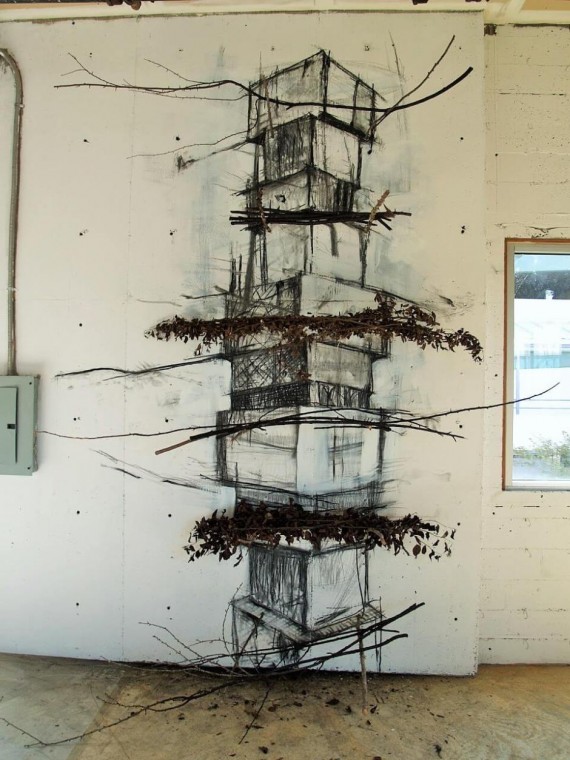 Craig Goodworth, Ecotone Study #1 (West wall), 2014
Craig Goodworth, Ecotone Study #1 (West wall), 2014
ERRAND
(To single out one figure, to unbind a smile, one being, from a multitude of identical forms and
fortunes, to gift it with an identity, to snare it into smaller and smaller grids.)
45° 27′ 59.282” North.
Occluded veins climbing dry
their meagre cyanotic exhaling, their moisture thirst. Leather I hear
bartered or persuaded just the same, the manifestation of you
worn tumbles in to film to adhere dilapidated sights.
An ambition of flies stains the notion of you afar:
in motion seaward
under a long skirt hymns and waves of Latin caravan,
capillaries in white bouquet to wheel and gather bounded pearls
pounding still their pallid glow about the shore. Solely stands
your tilting foot its insubstantial touch:
barren, carved, old and trampled, the marble below.
10° 35′ 31.39” East.
Owns of dead pianists
dangling
a Celestial note
guessing their rank
amongst your lines of plaster.
The aristocracy of your new shoes hanging from a last-minute sale to a door handle; in a
spare tea floating mould tells the time and one lost donated ring sits to leak at sink-side
its slush: fleshy suppuration thus caught over this old game of spot and sound
all glowingly encrusted
blind faith still holds against loaded chains, market deeds
most cherished life’s inheritance we shall share once conveyed a few cardinal questions.
_________________________
Massimo Fantuzzi
Review by Jared Pearce
How the world has to click together to bring objects and even ideas or values to an individual is, I think, nicely developed here. For me the second paragraph’s images and sounds are especially striking.
Review by Dave Mehler
I confess I didn’t understand this poem. What drew me toward it and into it was the originality of voice, and the sonic pleasure of reading the words and hearing the sounds. I was willing to take in the poem in the same way one views an abstract, as impression and emotion, and some sense here and there. I trusted that this poet and poem knew what he and it were doing–that it may be full of self-referentially meaningful fragments, but those fragments in and of themselves apart from any comprehensive meaning or coherence were interesting enough in isolation. I understand that some poems are opaque, and with enough reads and sometimes even some writing about them will eventually allow themselves to be opened up–yes, I have experienced this many times with other poets–some demons only come out after prayer AND fasting. Other poems refuse entry, or require the author to open them up. This one is growing on me, and I almost feel as if I can follow it. For example, the beginning with this God’s eye view opening: ‘To single out one figure, to unbind a smile, one being, from a multitude of identical forms and fortunes, to gift it with an identity, to snare it into smaller and smaller grids.’ Along with the satellite coordinates almost makes sense, that the speaker is on a search for someone or something he wants to both ‘gift’ and ‘snare.’ The language and imagery of the first sets of lines and two stanzas are beautifully enigmatic. Somehow I think of the Eliot in Four Quartets, where the language and imagery is abstract and opaque, and admittedly self-referential but one never doubts a purpose or ultimately the control of the speaker. A reader may not like where he or she is being led but never doubts the control of the poet/speaker or that one is in the presence of exceptionally good work.
But when we get down to these lines:
The aristocracy of your new shoes hanging from a last-minute sale to a door handle; in a
spare tea floating mould tells the time and one lost donated ring sits to leak at sink-side
its slush: fleshy suppuration thus caught over this old game of spot and sound
all glowingly encrusted
I realize the poet’s thoughts are operating on a different and possibly higher plane than mine and any hope of tracking with them or discovering direct correspondences will not be possible–the first three lines put me in mind of Dali’s melting pocket watch and strike me as equally surreal–a leaking ring–are we talking about the ring a tea-cup leaves or jewelry? We don’t always read poems merely for meaning, or insist on tracking with intent, but I sense and know it’s there, obscured and hidden, either because of my ignorance, or because the poet isn’t interested in revealing it or actually wishes it to remain hidden.
blind faith still holds against loaded chains, market deeds
most cherished life’s inheritance we shall share once conveyed a few cardinal questions.
Again, this so reminds me of Eliot, the Anglican. Massimo, I hope you will take this as a compliment. Your voice is yours, and original, and I think idiosyncratically distinctive. Additionally, I think over the course of the three poems of yours I’ve read you are dealing with metaphysical inquiry, which I find very intriguing. The fragmentation, erudition and surrealism bring me in mind of high modernism. The subject matter strikes me as ultimately personal and religious but also relevant to the culture at large, all of which, perhaps, is why I think of Eliot? On one level, mildly frustrating, I do find more than enough engagement in the beauty, mystery and ambiguity in the language and imagery.
